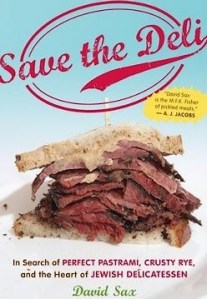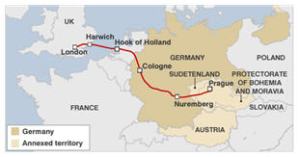One of my last stops in New York City before heading to the airport is a visit to Artie’s Deli on Broadway. My husband’s “care package” includes a few pounds of both extra-lean corn beef and pastrami, a loaf of real Jewish rye, real deli mustard. I freeze the meat and pack everything in my carry-on. Now that’s a real welcome back dinner!
In Israel, however, I haven’t found one real deli. How is it possible for a Jewish country NOT to have even one real deli? I salivate over fresh-roasted thin-carved turkey breast on good NY rye, slathered with thick Russian dressing, a bowl of sour pickles and another of good coleslaw. My husband dreams about real NY corn beef and pastrami.
But here? No such thing. I roast my own turkey breast, so I’m covered in that department, but I’m not up to what my grandmother and great-grandmother did – making their own corn beef, pastrami and pickles. You can season and broil (to the rare-ish state) a nice piece of sinta, and thin slice it for sandwiches the next day, but it isn’t the same thing.
Only back a few weeks, I’m already having deli day dreams, so this JTA book review by Sue Fishkoff, published in the Jerusalem Post here came at exactly the right time. Coming out in August is David Sax’s “Save the Deli: In Search of Perfect Pastrami, Crusty Rye and the Heart of Jewish Delicatessen.”
Yum. Oh, to be in a city with one of these major destinations!
This one just went to the top of my book wish list.
When it comes to Jewish delicatessen, 30-year-old David Sax is the go-to guy. A longtime deli aficionado, the annoyingly trim Sax spent three years eating his way through more than 150 Jewish delis to research “Save the Deli: In Search of Perfect Pastrami, Crusty Rye and the Heart of Jewish Delicatessen,” a wistful, riotously funny paean to this quintessential slice of American Jewish history.
The book, which will be published in October by Houghton Miflin Harcourt, is a delicious romp through a fast-disappearing world.
In 1931, Sax reports, there were 2,000 delis in New York City, three-quarters of them kosher. Today, Sax says, his research turns up 25 Jewish delis in the city, two-thirds of which are kosher. A similar pattern has followed across North America, with city after city sounding the death knell for its last traditional deli. Sax guesses there are just a few hundred left worldwide, most of them in the United States.
“The Jewish deli is dying,” Sax told JTA. “Each time I hear a deli closes, something inside me dies.”
The kosher pastrami sandwich may date from the late 1880s, as Fishkoff mentions writer Patricia Volk who told Sax that her great-grandfather was the first to make one. German immigrants brought this type of business to New York in the 1820s, according to Sax. About half-a-century later, MOTs were making kosher variations to the treif foods, such as schmaltz instead of lard, etc.
There’s a discussion of kosher versus kosher-style (which isn’t) and that the high cost of kosher meat means few places can afford it.
But most of this book is about food, the gloriously fatty, heart-stopping Ashkenazi cuisine that is the signature of the Jewish deli: braised brisket in wine sauce; pickled tongue; cabbage rolls in sweet-and-sour tomato; matjes herring; and, of course, the litany of “k’s,” the knishes, kreplach, kugel and kvetching.
He saves his highest praise for the deli meats: corned beef pickled and boiled in vats of brine; pastrami, lovingly rubbed with secret spice mixtures, then smoked and steamed to perfection. The way to suss out a good deli, he says, is to order the matzah ball soup and whatever deli meat the city specializes in, be it corned beef, tongue, pastrami or smoked beef, a softer, gentler Canadian variant.
Delis are nostalgia, as we remember our childhoods, visits with grandparents or great-grandparents. I remember those horrible-by-today’s-standards absoutely delicious greasy thick-cut deli fries back on Avenue D in East Flatbush. By the time you got a bag home, you were covered in dripping oil. The indescribable taste was like nothing else anywhere.
I don’t want wasabi-shmeared corn beef or turkey breast. For wasabi, I go to any number of excellent Japanese restaurants in Tel Aviv. I don’t need fushion deli-Asian. I’m a purist when it comes to this kind of food. I may just decide to put up a barrel (well, maybe a glass jar!) of pickles or a hunk of meat, if I get desparate enough.
And if you are looking for great Jewish pastrami or cornbeef in Northern California’s Silicon Valley, there’s a fantastic kosher restaurant in Mountain View (the home of Google) called The Kitchen Table where the young brilliant chef makes his own pickled meats and pickles. The highest compliment I can pay to The Kitchen Table is that we went there three times and most people didn’t even know it was kosher. The food was creative, fresh and excellent. The chef even makes kosher lamb bacon – now that was a BLT to remember! Since our visits, I’ve been making yam fries. Visit the Table’s website for the menu, and make sure to eat there when you’re in Google’s neighborhood.
The article ends with a lament about the disappearing delis of San Francisco, and that it’s a shanda for only two delis to serve a region with more than 350,000 Jews. What about here in Israel, where there are millions of people without even one deli?
Friends and relatives planning a Tel Aviv trip might want to visit their good neighborhood deli and bring some along for us.
Oh, and the other delicacy lacking is Reese’s Peanut Butter Cups (the bags of mini’s are best). Hint hint!
Filed under: Book, California, Food, Israel, Jewish Family, Jewish Heritage, Jewish History, New York, US | 1 Comment »




